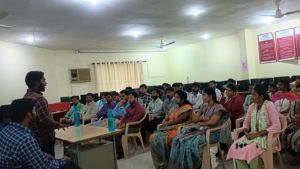Academics
Welcome to Civil Engineering
PEOs, POs & PSOs
PEO's
PEO2: To develop an ability to identify, formulate, solve problems along with adequate analysis, Design, synthesizing and interpretation skills in civil engineering systems.
PEO3: To exhibit professionalism, ethics, communication skills and team work in their profession and engaged in lifelong learning of contemporary civil engineering trends.
PSO's
PSO2: Ability to use knowledge of various domains to identify research gaps and to provide solutions to new ideas and innovations.
PO's
Engineering Graduates will be able to:
PO 1: An ability to apply knowledge of mathematics, science, and engineering.
PO 2: An ability to design and conduct experiments, as well as to analyze and interpret data.
PO 3: An ability to design a system, component, or process to meet desired needs within realistic constraints such as economic, environmental, social, political, ethical, health and safety, manufacturability.
PO 4: An ability to function on multidisciplinary teams.
PO 5: An ability to identify, formulates, and solves engineering problems.
PO 6: An understanding of professional and ethical responsibility.
PO 7: An ability to communicate effectively.
PO 8:The broad education necessary to understand the impact of engineering solutions in a global, economic, environmental, and societal context.
PO 9:A recognition of the need for, and an ability to engage in lifelong learning.
PO 10: A knowledge of contemporary issues.
PO 11: An ability to use the techniques, skills, and modern engineering tools necessary for engineering practice.
PO 12: An ability to carry out research in different areas of Civil Engineering including latest technology like GIS/Remote Sensing resulting in design, development, analyze and journal publications and technology development.
Active Learning
Innovative Teaching Techniques
Teaching is an art and science. Teaching is a process of imparting knowledge and skills. It is a systematic process based on some educational objectives to communicate.
The following innovative teaching methods are being adopted:
Model
 Model making in civil engineering serves as a bridge between theoretical design and practical implementation. By effectively creating and using models, engineers can enhance the quality and success of their projects.
Model making in civil engineering serves as a bridge between theoretical design and practical implementation. By effectively creating and using models, engineers can enhance the quality and success of their projects.- Creating a model in civil engineering is a crucial part of the design and planning process. It allows engineers and stakeholders to visualize projects, test designs, and assess feasibility before construction begins.
Benefits with Model Making:
- Visualization: Helps stakeholders understand the project.
- Design: Models enable engineers to test design concepts and assess their feasibility before construction.
- Testing: Validates design choices under various conditions.
- Communication: Aids in conveying ideas to clients and regulatory bodies.
- Enhanced Collaboration: Models facilitate collaboration between different engineering disciplines (structural, environmental, etc.) by providing a shared reference point.
- Cost and Time Efficiency: By identifying issues early, models can help minimize rework during construction, saving both time and money.
Prototype
 A prototype refers to an initial model or version of a structure or system that is built to test and validate design concepts, materials, or construction techniques.
A prototype refers to an initial model or version of a structure or system that is built to test and validate design concepts, materials, or construction techniques.- Prototypes can vary in scale and complexity, but their main purpose is to serve as a tangible representation of an idea before full-scale construction begins.
- A prototype in civil engineering serves as a critical tool for testing, validation, and demonstration, ultimately leading to more effective and efficient project outcomes.
- Prototypes can take various forms, including physical models, digital representations, or mock-ups, depending on the context.
Benefits with Prototype:
- Testing
- Validation
- Demonstration
- Cost Savings
- Risk Reduction
- Stakeholder Buy-In
Expert talk
 The term “expert talk” typically refers to a discussion or presentation given by someone who has specialized knowledge or skills in a particular field. This can take various forms, including lectures, seminars, panel discussions, or interviews, where the expert shares insights, findings, and perspectives on specific topics.
The term “expert talk” typically refers to a discussion or presentation given by someone who has specialized knowledge or skills in a particular field. This can take various forms, including lectures, seminars, panel discussions, or interviews, where the expert shares insights, findings, and perspectives on specific topics.
Key Characteristics of Expert Talk:
- Specialized Knowledge: The speaker possesses deep expertise and experience in their area, which can include academic qualifications, professional experience, or notable achievements.
- Informative Content: The talk often includes detailed information, data, case studies, and practical examples to support the discussion.
- Audience Engagement: Expert talks may involve interaction with the audience, allowing for questions and discussions that deepen understanding.
- Purpose: The goal can be to educate, inspire, inform about recent developments, or share best practices within a specific discipline.
- Formats: Expert talks can occur in various settings, such as conferences, workshops, webinars, and community events.
Benefits with Expert talk:
- Knowledge Sharing
- Enhanced Learning
- Networking Opportunities
- Inspiration and Motivation
- Critical Thinking and Discussion
- Staying Current
- Professional Development
- Community Engagement
Role Play
 Role play refers to the act of acting out or performing a particular role, character, or scenario, often for educational, training, or entertainment purposes. It can involve individuals or groups taking on specific roles to simulate real-life situations, allowing them to explore behaviors, decision-making, and interpersonal interactions.
Role play refers to the act of acting out or performing a particular role, character, or scenario, often for educational, training, or entertainment purposes. It can involve individuals or groups taking on specific roles to simulate real-life situations, allowing them to explore behaviors, decision-making, and interpersonal interactions.- Role play is a versatile technique that can enhance learning, foster creativity, and improve social skills by allowing individuals to experience different perspectives and situations.
Benefits with Roleplay:
- Skill development
- Empathy and Understanding
- Real-Life Preparation
- Team Building
- Feedback and Reflection
- Enhanced Learning
- Stress Relief
- Therapeutic Benefits


 Model making in civil engineering serves as a bridge between theoretical design and practical implementation. By effectively creating and using models, engineers can enhance the quality and success of their projects.
Model making in civil engineering serves as a bridge between theoretical design and practical implementation. By effectively creating and using models, engineers can enhance the quality and success of their projects. A prototype refers to an initial model or version of a structure or system that is built to test and validate design concepts, materials, or construction techniques.
A prototype refers to an initial model or version of a structure or system that is built to test and validate design concepts, materials, or construction techniques. Role play refers to the act of acting out or performing a particular role, character, or scenario, often for educational, training, or entertainment purposes. It can involve individuals or groups taking on specific roles to simulate real-life situations, allowing them to explore behaviors, decision-making, and interpersonal interactions.
Role play refers to the act of acting out or performing a particular role, character, or scenario, often for educational, training, or entertainment purposes. It can involve individuals or groups taking on specific roles to simulate real-life situations, allowing them to explore behaviors, decision-making, and interpersonal interactions.